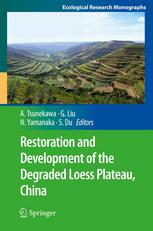

Most ebook files are in PDF format, so you can easily read them using various software such as Foxit Reader or directly on the Google Chrome browser.
Some ebook files are released by publishers in other formats such as .awz, .mobi, .epub, .fb2, etc. You may need to install specific software to read these formats on mobile/PC, such as Calibre.
Please read the tutorial at this link: https://ebookbell.com/faq
We offer FREE conversion to the popular formats you request; however, this may take some time. Therefore, right after payment, please email us, and we will try to provide the service as quickly as possible.
For some exceptional file formats or broken links (if any), please refrain from opening any disputes. Instead, email us first, and we will try to assist within a maximum of 6 hours.
EbookBell Team

4.4
72 reviewsThis book presents state-of-the-art scientific evidence and technological innovations to restore lands on the Loess Plateau of China, known worldwide for its serious land degradation and desertification problems. Supported by a rapidly developing Chinese economy and the dissemination of effective technology, the Grain-for-Green Project and Western Development Action launched by the Chinese government have resulted in successful ecological restoration and protection over the past 30 years. These programs have contributed not only to conservation of soil and water, but also to economic development. At the same time, however, these developmental interventions have brought new challenges that have not yet been fully addressed. The book describes (1) case studies of success and failure in practice, including rare success stories of combating desertification; (2) technical issues such as erosion control and breeding of stress-tolerant plant species, and socioeconomic measures taken by the Chinese government and lending policies with support from the World Bank; and (3) comprehensive measures against desertification, such as water and wind erosion, salinization, and deforestation. This volume is recommended for researchers and students above the undergraduate level in diverse fields including soil science, rural engineering, social technology and civil engineering, biology, ecology, climatology, physical and human geography, and developmental economics, among others. It also serves as a valuable resource for engineers, government officials, and NPOs and NGOs involved in afforestation, ecological restoration, combating desertification, disaster prevention, and sustainable rural development.